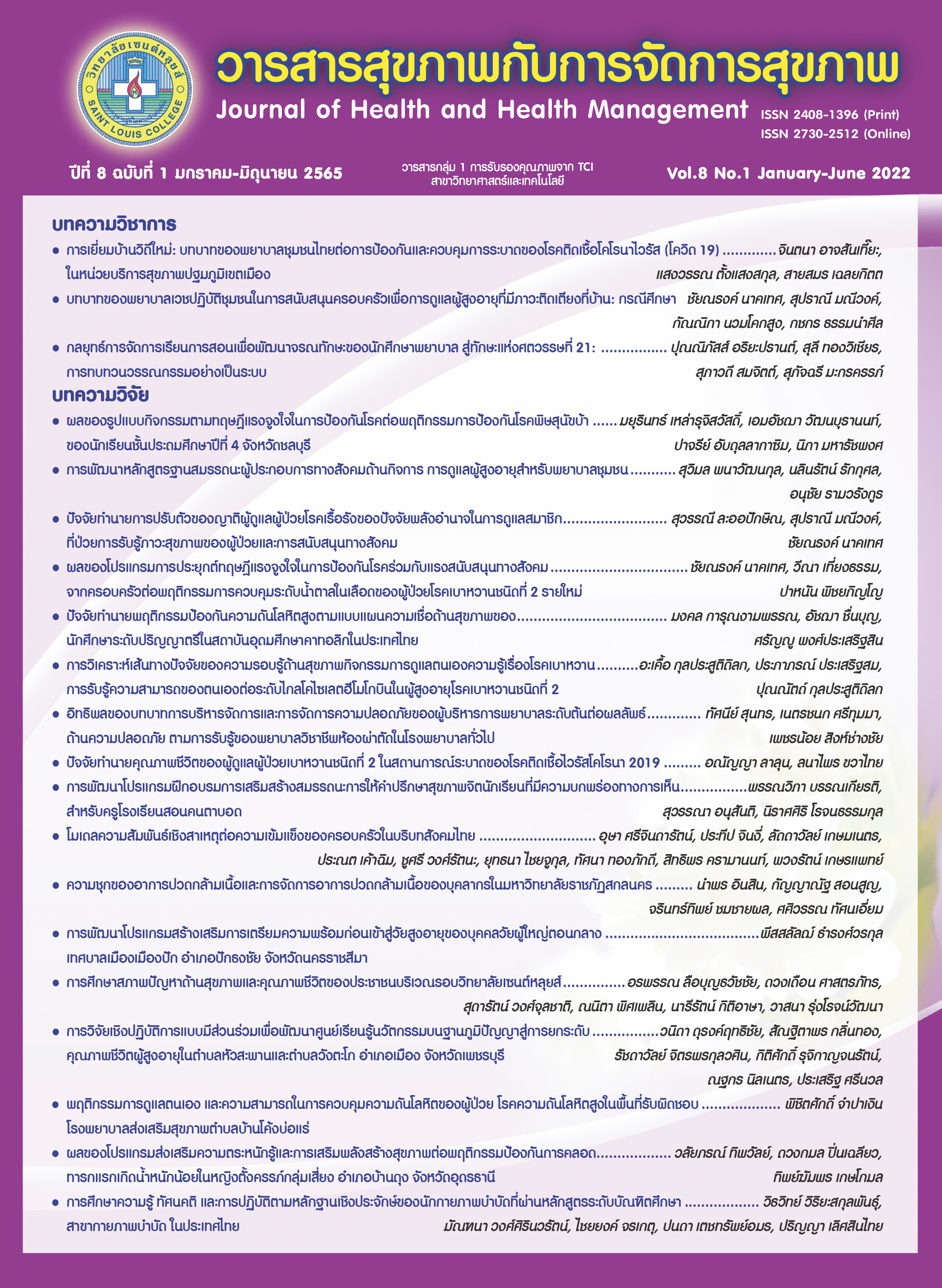A Study of Knowledge, Attitude, and Evidence-based Practice of Physical Therapists After Postgraduate Physical Therapy Program in Thailand
Keywords:
Evidence-based practice, Physiotherapy, Postgraduate program, SurveysAbstract
The use of evidence-based practice (EBP) is an important component to improve the quality of treatment in physical therapy. This study aimed to: 1. explore the level of knowledge, attitude, and practice (KAP) of EBP and to identify the relationship between these variables among Thai physical therapists after completing a postgraduate physical therapy programme in Thailand; and 2. to study the associations between personal-work characteristics and the level of knowledge, attitude, and practice of EBP. An online questionnaire was used to obtain information from the samples of 215 physical therapists. Completed questionnaires were returned by 82 physical therapists (response rate of 38.14%). Descriptive statistics were used to report the responses. Spearman’s rank correlation statistic and Chi-Square test were used to determine the association. The results indicate that the physical therapists’ levels of knowledge, attitude, and practice of EBP were good, excellent, and excellent, respectively. Knowledge had a significantly positive correlation with both attitude (moderate level, rs=0.724, p < 0.001) and practice of EBP (low level, rs=0.454, p 0. < 001). Attitude had a significant moderate positive correlation with practice of EBP (rs=0.749, p < 0.001). The personal-work characteristics, such as degree of education, workplace, and average number patients per day, were significantly correlated with the level of knowledge, attitude, and practice of EBP among physical therapists after completing a postgraduate physical therapy programme (from 2002 to 2019) in Thailand. Therefore, embedding EBP education coursework in the core curriculum for postgraduate physical therapy programme is an important component to improve the quality of treatment in the physical therapy educational system.
References
Alrowayeh, H.N., Buabbas, A.J., Alshatti, T.A., AlSaleh, F.M., & Abulhasan, J.F. (2019). Evidence-based physical therapy practice in the State of Kuwait: A Survey of attitudes, beliefs, knowledge, skills, and barriers. JMIR Medical Education, 5(1), e12795. https://doi.org/10.2196/12795
Bajracharya, S., Tharu, N.S., & Bokalial, D. (2019). Knowledge, attitude and barrier to evidence-based practice among physiotherapists in selected districts of Nepal. Journal of Nepal Health Research Council, 17(2), 215-221. https://doi.org/10.33314/jnhrc.v0i0.1711
Bloom, B.S. (1975). Taxonomy of educational objectives: The classification of educational goals. Handbook I: Cognitive domain. New York: David McKay Company.
Cochran, W.G. (1963). Sampling technique (2nded). New York: John Wiley and Sons.
Hinkle, D.E. (1998). Applied statistics for the behavioral sciences. Boston: Houghton Mifflin.
Israel, G.D. (1992). Sampling the evidence of extension program impact. Program evaluation and organizational development, IFAS, University of Florida, PEOD-6. Retrieved from: https://www.tarleton.edu/academicassessment/documents/samplesize.pdf
Jette, D.U., Bacon, K., Batty, C., Carlson, M., Ferland, A., Hemingway, R.D., . . . Volk, D. (2003). Evidence-based practice: beliefs, attitudes, knowledge, and behaviors of physical therapists. Physical Therapy, 83(9), 786-805. https://doi.org/10.1093/ptj/83.9.786
Joseph, P. M. (2011). Knowledge, attitudes, and practices of physiotherapists regarding their role in health promotion in Gauteng Province, South Africa (Doctoral dissertation, University of Limpopo (Medunsa Campus)).
Manns, P. J., Norton, A. V., & Darrah, J. (2015). Cross-sectional study to examine evidence-based practice skills and behaviors of physical therapy graduates: is there a knowledge-to-practice gap?. Physical Therapy, 95(4), 568-578. https://doi.org/10.2522/ptj.20130450
Moolsin, W. (2012). Principles of research and statistical analysis with SPSS for research purposes (1rded). Bangkok: Software Industry Promotion Agency.
Office of The Higher Education Commission. (n.d.). National qualifications framework for higher education 2013. Retrieved from: https://www.ops.go.th/images/2563/tqf-hed/46f2014123010571573.pdf
Rattanamanee, N., & Phasunon, P. (2019). Response rate in quantitative research. Journal of Humanities and Social Sciences Thonburi University, 13(3), 181-188.
Sackett, D.L., Strauss, D.E., Richardson, W.S., Rosenberg, W., & Haynes, R.B. (2000). Evidence-based medicine: How to practice and teach EBM (2nd ed). New York: Churchill Livingstone.
Sota, C. (2011). Concept theory and application for health behavioral development (3rded). Khon Kean: Health education promotion program, Faculty of Public Health, Khon Kean University.
Vongsirinavarat, M., Mathiyakom, W., Krityakiarana, W., Hengsomboon, N., & Kraiwong, R. (2020). Survey of attitudes, knowledge, and barriers to evidence-based practice among thai physical therapists. Internet Journal of Allied Health Sciences and Practice, 18(4), 1-15. https://doi.org/10.46743/1540-580X/2020.1878
World Confederation for Physical Therapy. (2011). Education, policy statement: EBP. Retrieved from: https://world.physio/sites/default/files/2020-04/PS-2019-Education.pdf
Downloads
Published
How to Cite
Issue
Section
License
Copyright (c) 2022 Journal of health and health management

This work is licensed under a Creative Commons Attribution-NonCommercial-NoDerivatives 4.0 International License.




